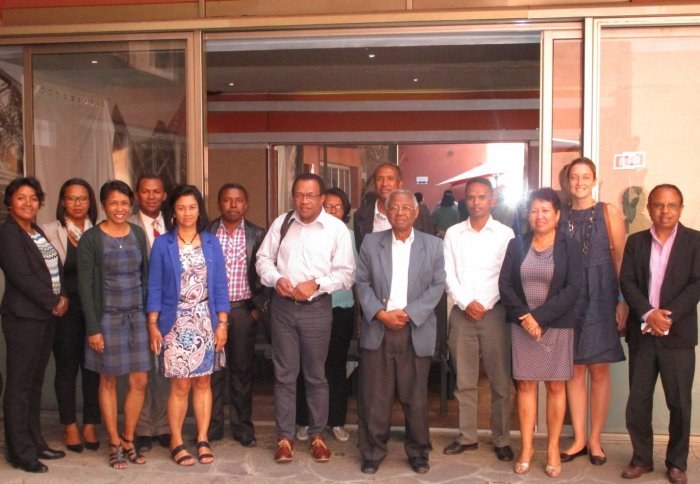Collaborating with WASH partners to eliminate schistosomiasis in Madagascar

WASH and schistosomiasis control partners, with the Madagascan Ministry of Health team
WASH and schistosomiasis control partners met in Madagascar to determine ways to combine efforts to eliminate schistosomiasis.
Recent figures show that less than half of the population of Madagascar has access to safe drinking water and only one in ten has access to hygienic sanitation facilities.
Schistosomiasis, a parasitic worm infection that is carried by freshwater snails and is transmitted through contact with contaminated water in areas with poor access to clean water, can cause a range of problems if left untreated, including impaired development and reduced school attendance in children, and internal organ damage in both children and adults.
The Schistosomiasis Control Initiative (SCI) at Imperial College London, has been supporting treatment programmes against schistosomiasis in Madagascar since 2014 and has been successful in treating 2.9 million school-age children to date. However, 7.8 million people (of all ages) are estimated to still be infected and require treatment.
Due to its low cost, treatment programmes against schistosomiasis are one of the most cost-effective solutions to bring the disease under control in a relatively short space of time. However, without continued treatment in areas of poor sanitation and clean water, the disease will quickly bounce back to pre-intervention levels.
The Ministry of Health (MoH) in Madagascar therefore feel it is important to start implementing WASH (Water, Sanitation and Hygiene) initiatives in the country in order to make disease control activities more sustainable and set-up a long-term solution to achieve elimination.
With coordination by the MoH, representatives from the schistosomiasis and WASH communities, including SCI, UNICEF-WASH, the World Health Organization and the Madagascan Ministry of Education, met on 28 September to discuss ways they could collaborate to achieve shared goals in improving sanitation and access to clean water in areas that need it most, and to control and eliminate schistosomiasis.
During this first meeting, they discussed how to re-start activities for the country’s “Diorano WASH” programme. Ran-EAU, a platform which facilitates meetings between different WASH partners, will help facilitate meetings between the MoH, WASH and schistosomiasis partners going forward to create greater opportunities for them to work together more closely and exchange ideas. For example, an idea has been proposed to utilise GIRE, a database of all water bodies managed by the country’s Ministry of Water, Energy and Fuel, to add data collected by the MoH (with the support of SCI) on areas of risk of schistosomiasis infection, to determine which areas are most in need of WASH interventions.
The MoH are determined to make the implementation of WASH initiatives possible to help achieve a greater impact in schistosomiasis reduction, and with the strong will of the WASH and schistosomiasis control partners to support these initiatives, they are sure to help them realise their ambitions.
Dr Sarah Nogaro, SCI's Programme Advisor for Madagascar says: "This is the start of an exciting new collaboration between the health and WASH sector in Madagascar. Combining efforts from both sectors will mean the synergy will be even greater and a leap forward in reaching the targets set out in the UN Sustainable Development Goals. This cross-sectoral partnership also aligns with the holistic policy approach within the Sustainable Development Goals."
Article text (excluding photos or graphics) © Imperial College London.
Photos and graphics subject to third party copyright used with permission or © Imperial College London.
Reporter
Press Office
Communications and Public Affairs
- Email: press.office@imperial.ac.uk
